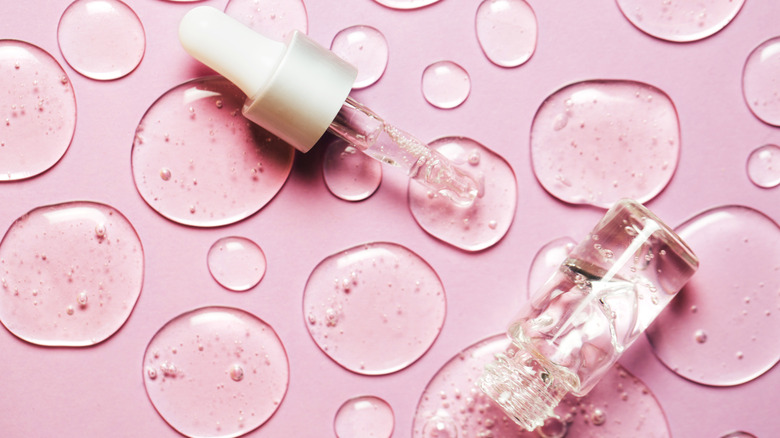How Hyaluronic Acid Changes Your Skin
Hyaluronic acid is a naturally occurring sugar molecule found in the eyes and skin (via Allure). It's also an active ingredient in a variety of skin care products. That's because hyaluronic acid increases hydration in the skin by binding and drawing in moisture from the surrounding air.
When used topically, hyaluronic acid acts as a humectant, attracting water to the surface of the skin. This allows your skin cells to retain and regulate moisture, and makes your skin appear more plump, supple, and dewy (via Everyday Health). As a result, hyaluronic acid is a key ingredient in many serums, moisturizers, and eye creams.
"Hyaluronic acid penetrates easily, which is why it works so well when applied topically," cosmetic chemist Sandra Bontempo told Allure. "Our skin is the largest organ in the body and absorbs up to 60 percent of nutrients we apply to it." Hyaluronic acid is also gentle on the skin. Unlike other skincare products, hyaluronic acid will not irritate the skin and cause rosacea, acne flare-ups, or other skin reactions.
The skin benefits of hyaluronic acid
Hyaluronic acid can also reduce the appearance of fine lines and wrinkles on your skin. Research has shown that skin aging is often a result of dryness and loss of moisture in the skin. Hyaluronic acid's ability to draw in moisture and rehydrate the skin, however, can help reduce and even reverse some of the effects that aging has on the skin (via Everyday Health).
"Because of its water-pulling qualities, hyaluronic acid can refine and age-rewind in those dry, sunken, or 'crepe' areas," Dr. Bonnie Gasquet, an internal medicine physician, told Everyday Health. Gasquet particularly recommends using products containing hyaluronic acid during the dry winter months when skin is especially prone to losing moisture, but this ingredient can also provide benefits year-long. If applied continuously, hyaluronic acid can help rehydrate and rejuvenate your skin, giving you a healthy and refreshed glow.


